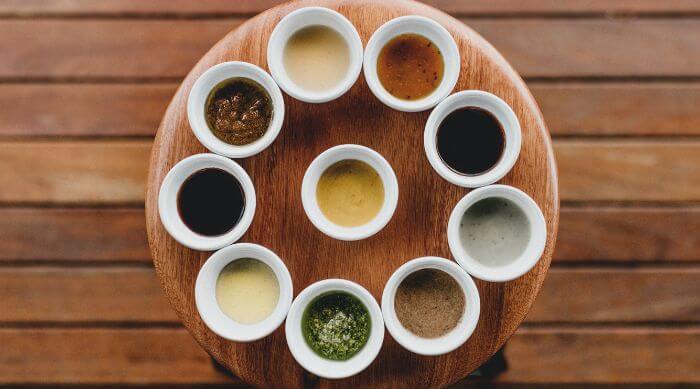A lot has been said about the benefits of wine. It is usually considered the healthiest choice if you’re drinking alcohol.
The thing is, any potential health benefits of drinking red wine really depend on your habits.
Table of Contents
5. Reduced Insulin Resistance & Type 2 Diabetes
6. Cancer Prevention and Treatment
Nutrition: What’s in there?
Red wine gets most of its nutrition from the grape skins of red and dark-colored grapes used in the production of wine.
We’ll get into its antioxidant content in a minute, but red wine is also lower in sugar and relatively low in carbs compared to other types of alcohol. That makes it a better choice for dieters on low-carb plans (like the keto diet) or anyone watching their sugar intake.
Which red wine is healthiest? Pinot noir is often rated as the healthiest red wine. This is usually because it has high levels of antioxidants, including resveratrol.
Resveratrol is the top antioxidant that differentiates red wine from white wine. Rosé wine retains some of that benefit thanks to its pink hue, but it can’t compete with red wine when it comes to high levels of antioxidant content.
That’s because resveratrol comes from red grape skins, and red wine is fermented with those skins intact.
While it is a beneficial compound, we should note that the amount of resveratrol in red wine is still relatively nominal. In fact, you would have to drink more wine than is physically possible to get the recommended daily amount of resveratrol. If you really want to boost your intake of this antioxidant, a supplement is the best source.
Is red wine the healthiest alcohol? There is no clear evidence that red wine is the healthiest alcohol. In fact, studies show that any type of alcohol, consumed in moderation, has a positive impact on HDL cholesterol. The healthiest alcohol options for your diet depend on your specific needs.
1. Antioxidants
Red wine is high in polyphenols like resveratrol, anthocyanins, catechins, and tannins. The tannins in red wine include proanthocyanidins and ellagitannins, two antimicrobials linked to better gut health. A wine high in tannins is usually high in resveratrol.
These plant-based compounds, or flavonoids, act as powerful antioxidants that fight cancer-causing free radicals and inflammation in the body.
This is where most of the arguments for the benefits of red wine and moderate red wine consumption begin. The antioxidants act similarly to supplements in healthy diets, offering the body some protective effects for various chronic diseases.
Again, any of the benefits we’ll go into are dramatically reduced as alcohol intake increases and becomes more of a health problem than a net positive.
2. Heart Health
Thanks to the controversial French Paradox, much of the research on the benefits of red wine focuses on cardiovascular health.
The moderate consumption of red wine has been linked to reduced blood pressure, healthier blood vessels, and a reduced risk of blood clots. It’s also been linked to increased high-density lipoprotein (HDL) cholesterol.
HDL cholesterol is the good kind of cholesterol that reduces your risk of heart attacks and stroke. Olive oil, fatty fish, avocado, and nuts are all great sources of HDL cholesterol and components of the Mediterranean diet.
Studies have also examined whether red wine reduces low-density lipoprotein (LDL) cholesterol levels — the bad kind of cholesterol. So far, those benefits are only consistently seen in non-alcoholic wine, which is great news for Surely fans.
The American Heart Association is more cautious when discussing the reduced risk of heart disease and high blood pressure. First of all, it’s challenging to isolate other dietary choices in heart-healthy lifestyles when looking at the real benefits of red wine.
Many red wine drinkers may also be following a regular exercise routine or a heart-healthy Mediterranean diet, for example, whether they’re doing so consciously or not.
The amount of antioxidants needed for these cardioprotective benefits is actually easier to get through other means. Eating a handful of fresh grapes or blueberries or a bar of dark chocolate can also lower your blood pressure; no fermentation required.
3. Dementia Prevention
Light to moderate red wine consumption may be linked to improved cognitive outcomes among the elderly, including a reduced dementia risk, improved memory, and overall longevity. That may be because of red wine’s ability to reduce oxidative stress.
Oxidative stress damages our cells and DNA as we get older. It’s responsible for several degenerative diseases, including Alzheimer’s, Parkinson’s, and age-related spinal disorders.
Those anti-aging effects diminish with increased alcohol use, though. It’s well-documented that heavy drinkers, especially those already at risk of Alzheimer’s disease, experience a more rapid cognitive decline than non-drinkers.
In fact, some heavy drinkers mimic Alzheimer’s symptoms without the disease because of alcohol’s effects on the brain.
4. Reduced Depression
There is some evidence that drinking moderate amounts of red wine leads to a lower risk of depression. This may be thanks to some neuroprotective effects in red wine. Some researchers have identified anti-stress enzymes in the body that are activated by antioxidants in red wine.
The theory goes that less overall stress in the brain and the body may positively affect mental health outcomes.
However, heavy drinkers and those with alcohol use disorders are at higher risk for depression and may experience more intense depressive symptoms and bouts of depression.
Alcohol can also affect your sleep, your desire to monitor physical activity and diet, and your ability to socialize. All of these factors can make mental health problems like depression worse.
It should go without saying that red wine should never be a substitute for a professionally recommended mental health program.
You should always talk to your doctor about drinking alcohol on medications, including antidepressants. Alcohol may reduce the efficacy of some medications, and many just don’t mix with alcohol at all.
5. Reduced Insulin Resistance & Type 2 Diabetes
Moderate red wine consumption may help those with diabetes to regulate their condition and improve diabetes outcomes. Red wine appears to have some benefits in managing glucose and blood sugar levels.
For patients with type 2 diabetes, too much glucose can cause various health problems down the line, including an increased risk of heart disease, digestive issues, and kidney problems.
It’s important to note that most diabetes studies followed subjects already on controlled diets. It’s unclear whether red wine would affect diabetes outcomes if patients weren’t already watching their insulin and taking their condition seriously.
On the other hand, too much red wine can have the opposite effect on diabetes outcomes.
While moderate drinking is safe for many people with diabetes, heavy drinking can lead to a variety of complicationslike diabetic ketoacidosis and hypoglycemia. Heavy drinking can also damage your liver, affecting how your body metabolizes sugars.
6. Cancer Prevention and Treatment
Red wine's ability to reduce oxidative stress may help the body fight existing cancer cells and reduce risk of cancer.
Researchers don’t know exactly how this works. It's possible that wine’s anti-inflammatory effects limit harmful cell growth or even cause cell death in growing tumors.
One study reported promising results between red wine use and reduced cancer cell formation for breast cancer and esophageal cancer. That same study linked ethanol and moderate alcohol consumption with a reduced cancer risk overall, just to a lesser degree than red wine.
This doesn't mean non-drinkers should pick up red wine to fight off potential cancers or to improve cancer outcomes. Drinking to excess can lead to several types of cancer, including colorectal, liver, and esophageal cancers.
Red wine can both decrease and increase your risk of certain cancers, depending on how much you drink.
7. Oral Health
There is some evidence that moderate red wine consumption can reduce plaque buildup, cavity production, and your risk of severe gum infections like periodontitis.
That may be thanks to the acids and polyphenols in wine limiting the bacteria that sticks to your teeth. More research is needed to better understand how red wine interacts with your dental health, as studies are limited at this point.
If you’re worried about staining your teeth, by the way, red wine is on the shortlist for worst offenders alongside tea and coffee. Blame the chromogens in red wine. These are the pigments in red wine that give it that deep, rich color.
White wine lacks those natural dyes that do the most damage when it comes to stained teeth, but it also lacks some of the nutrients in red wine.
8. Gut Health
The same compounds that make red wine great for fighting oral bacteria also work in the gut. While studies are limited, evidence suggests wine can act like a prebiotic — modulating the gut microbiome and contributing to good bacteria.
This may be because of the compounds produced in the fermentation process. Fermented foods like kimchi are famously gut-friendly. As it turns out, a moderate amount of wine can prove just as beneficial in the short and long term.
On the other hand, excess consumption of wine, or any alcohol, can cause weight gain and digestive issues, from heartburn to gut inflammation.
Health Risks of Drinking Too Much
Any positive effects of red wine diminish if you drink too much. In fact, it’s as if all of those red wine benefits turn into negatives the more you indulge.
What are the negative effects of red wine? The negative effects of red wine mirror the negative effects of any alcohol. Heavy drinking can lead to sleep issues, mental health concerns, and an increased risk of various health conditions.
We’ve gone into some as we’ve discussed the benefits of red wine, including an increased risk of heart disease, cancer, stroke, liver disease, obesity, and nervous system problems. Some wine drinkers will also be at risk for developing an alcohol dependency.
If you or someone you know is struggling with alcohol abuse, there is help out there:
- Alcoholics Anonymous
- Substance Abuse and Mental Health Services Administration National Helpline (800-662-4357)
If you or someone in your immediate family has a history of alcohol abuse, avoiding alcohol altogether may be the safest course of action for you.
How Much Red Wine is Recommended?
According to dietary guidelines from the CDC, a moderate amount of wine is one alcoholic beverage per day for women and two for men.
These guidelines refer to standard size drinks, or about 5 oz of wine at a 12% ABV. Wine or alcoholic beverages with a higher alcohol content should be consumed at lower levels.
Is it OK to drink red wine every day? It is OK to drink wine every day or every night, as long as you’re not exceeding what is considered moderate drinking.
There is no definitive proof that you need to drink wine regularly to enjoy a healthy lifestyle. There isn’t a health professional out there that will tell you to pick up drinking to boost your immune system.
Any benefits diminish as red wine consumption increases. The benefits of not drinking alcohol will always outweigh the benefits you get from drinking wine, even if it’s a relatively healthy glass of red wine.
In fact, abstaining from alcohol altogether will always be better for you.
The good news is you don't have to drink alcohol to enjoy the benefits of red wine — and we’re not telling you to switch to grape juice!
Try non-alcoholic cabernet sauvignon or pinot noir from Surely. You’ll get all of the health benefits of red wine without the adverse effects of alcohol.
Sources
- Longitudinal study of alcohol consumption and HDL concentrations: a community-based study
- Resveratrol: How Much Wine Do You Have to Drink to Stay Healthy?
- Contribution of Red Wine Consumption to Human Health Protection
- Proanthocyanidins and hydrolysable tannins: occurrence, dietary intake and pharmacological effects
- Nonalcoholic red wine extract and quercetin inhibit LDL oxidation without affecting plasma antioxidant vitamin and carotenoid concentrations
- The cardiovascular implications of alcohol and red wine
- Risk of dementia and alcohol and wine consumption: a review of recent results
- Relationship of Wine Consumption with Alzheimer’s Disease
- Alcohol intake, wine consumption and the development of depression: the PREDIMED study
- Protective effect of red wine on oxidative stress and antioxidant enzyme activities in the brain and kidney induced by feeding high cholesterol in rats
- Alcohol Use Disorder and Depressive Disorders
- Effects of Initiating Moderate Alcohol Intake on Cardiometabolic Risk in Adults With Type 2 Diabetes: A 2-Year Randomized, Controlled Trial
- Consequences of Alcohol Use in Diabetics
- Wine and resveratrol: mechanisms of cancer prevention?
- The influences of red wine in phenotypes of human cancer cells
- Effect of red wine and its major components on periodontitis and systemic inflammation in rats
- Antimicrobial activity of red wine and oenological extracts against periodontal pathogens in a validated oral biofilm model
- The effects of grape and red wine polyphenols on gut microbiota - A systematic review
- Fermented Foods, Health and the Gut Microbiome
- Alcohol and Gut-Derived Inflammation




